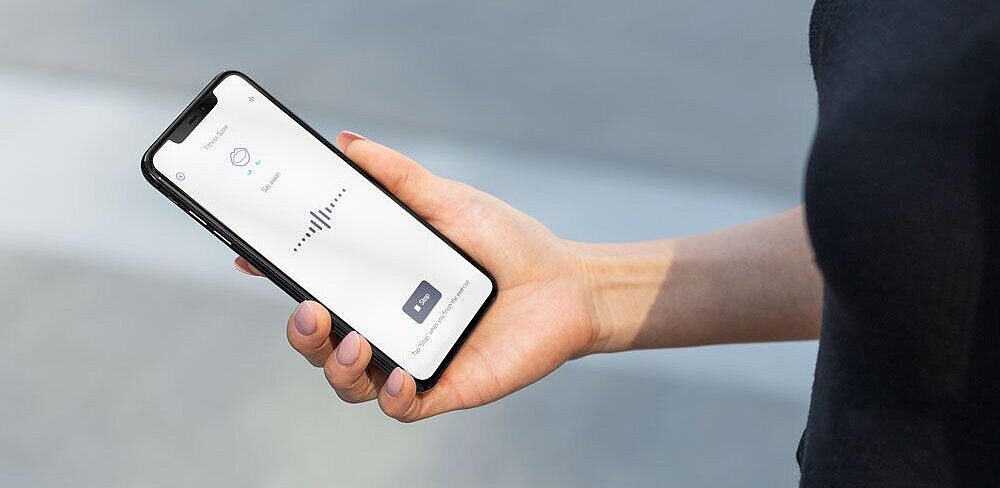Have you ever found yourself in a doctor's office, asked to take three deep breaths, and wondered what exactly the physician is listening for? It might seem like a routine request, but with each breath, cough, or spoken word, we unwittingly disclose crucial information about our health.
Our bodies possess a subtle language, and the future of healthcare lies in deciphering these nuanced sound signals called ‘vocal biomarkers’.
Though a formal definition of vocal biomarkers is yet to be framed, they are often defined as a specific feature of any sound produced by the vocal apparatus (for example, speech, breathing sounds or cough) that indicates a specific underlying physiological and/or pathophysiological condition.
In a world where our smartphones evolve into health companions, attuned not only to our spoken words but also to our physiological cues, healthcare takes on an entirely new dimension.
By combining sound analysis with artificial intelligence, it is possible to learn and recognise the distinctive patterns of our vocal biomarkers and leverage this information to push people towards healthy lifestyles, and health checks especially when there are early signs of health worsening.
Startups like VoiceMed analyze breath and voice to give health information about Cardiorespiratory Score and Lung score to push people towards both prevention of cardiovascular risks (first cause of death), as well as monitoring lung functions (third cause of death). All of this by using a smartphone only.
In the prevention space, the need of many healthcare providers and payers is to push people towards an active lifestyle, as 40% of deaths can be avoidable with good cardiorespiratory fitness and 5-7% reductions in health costs for each 1-MET higher CRF level.
That is why vocal biomarkers to measure cardiorespiratory health with instant results to the user can be a game-changer in pushing towards an active lifestyle, thus saving lives and reducing health costs.
Also, respiratory health stands out as a significant area where vocal biomarkers can play a pivotal role.
Alterations in speech patterns, breathing rhythms, and resonances may serve as indicators of worsening of pulmonary functions, that are relevant for respiratory disorders such as asthma, chronic obstructive pulmonary disease (COPD), or even early signs of infectious diseases affecting the respiratory system.
By meticulously analyzing these subtle sound signals, healthcare professionals can potentially identify and intervene in the nascent stages of such conditions, facilitating more effective and targeted interventions.
Patients gain the ability to self-manage their diseases more effectively, while the entire healthcare system becomes more streamlined and efficient.
The integration of vocal biomarkers holds promise not only in cardiorespiratory and respiratory health but spans across a spectrum of medical disciplines, offering a non-invasive and accessible means of monitoring and managing various health conditions, including neurodegenerative diseases and mood disorders.
Our voices subtly reflect our mood, stress levels, and overall mental well-being. Artificial intelligence algorithms, trained to discern these subtle variations, can provide insights into mental health conditions. Early detection of mood disorders, such as depression or anxiety, through vocal biomarkers, can pave the way for timely interventions and personalised treatment plans.
Moreover, vocal biomarkers can be instrumental in tracking neurodegenerative diseases like Alzheimer's and Parkinson's. Changes in speech patterns, articulation, and voice modulation may precede other observable symptoms, providing an early window for intervention. With the integration of vocal biomarkers into routine health monitoring, individuals at risk of such conditions can receive timely and targeted intervention, potentially slowing down the progression of these diseases.
This transformative approach transcends the traditional boundaries of healthcare, offering a holistic understanding of an individual's health encompassing both physical and mental aspects.
As we embrace vocal biomarkers, we're not merely decoding sounds; we're unraveling the language of well-being, ushering in a future where healthcare is not just personalised, preventive, and convenient but intimately connected to the unique pattern of each individual.
The beauty of vocal biomarkers lies not only in their potential for supporting diagnostic and monitoring but also in their capacity to facilitate preventive healthcare. Regular monitoring of vocal biomarkers can enable individuals to make lifestyle adjustments proactively, reducing the risk of developing certain health conditions.
That’s why the exploration of vocal biomarkers represents a paradigm shift in healthcare, which becomes more personalised, predictive, and seamlessly integrated into our daily lives.
Our bodies possess a secret language, encoded in the subtle nuances of our voices. Deciphering it opens the door to a future where healthcare is not just a service, but a tailored and empathetic companion on our lifelong journey of well-being.

Fulvio Cordella, Co-Founder and Biomedical Engineer at VoiceMed, has extensive experience in sound analysis for the diagnosis and monitoring of diseases. He previously worked as a researcher in the TechnoScience technological park in Rome, where he initiated his work on vocal biomarkers. Fulvio holds a Master of Science in Biomedical Engineering from Sapienza University. In addition to his technical expertise, he has experience as a voice actor, having graduated from the Voice Art Dubbing Academy of Rome.
We are always on the lookout for interesting contributors to our Grow Digital Insights column. Are you an industry leader or a researcher with an in-depth knowledge of the latest trends and applications of digital technology? Would you like to share your expertise and insights with EIT Digital's pan-European ecosystem of high-profile entrepreneurs, researchers, journalists, innovators and policy-makers? Please send your article proposals to press@eitdigital.eu or federico.guerrini@eitdigital.eu. We will review them and get back to you soon.
Write new comment
Comments Terms and Guidelines
Welcome to our comments section! We encourage open discussion and look forward to your thoughts and contributions. To maintain a respectful and engaging community, please adhere to the following guidelines:
- Be respectful: Treat all commenters with respect. Avoid insults, personal attacks, or disparaging remarks about individuals or groups. Respect others’ opinions and consider your impact on the community.
- Stay on topic: Keep your comments relevant to the subject of the article or post. Off-topic discussions can detract from the purpose of the forum and may be removed.
- No spam or advertising: Please do not post spam or advertisements. This includes unsolicited promotions, links to external sites, or repetitive posts.
- Avoid offensive content: Do not post comments that are discriminatory, racist, sexually explicit, or violent. Always consider the diverse audience that might be reading your comments.
- Use polite language: Avoid using offensive or vulgar language. Comments should be suitable for a public forum with a wide-ranging audience.
By participating in our comments section, you agree to follow these rules and contribute positively to our community. Comments that fail to adhere to these guidelines may be moderated or removed, and repeat offenders may be banned from commenting.
Thank you for helping us create a friendly and inclusive space for discussion!
Read more Grow Digital Insights
Read more expert posts about Digital Innovations.
Sign up for updates
Receive the latest news and events updates by subscribing to our newsletter.
For media contacts
Are you a member of the media and would you like to contact us?
→ Get in touch with us here


Comments (0)
No comments found!